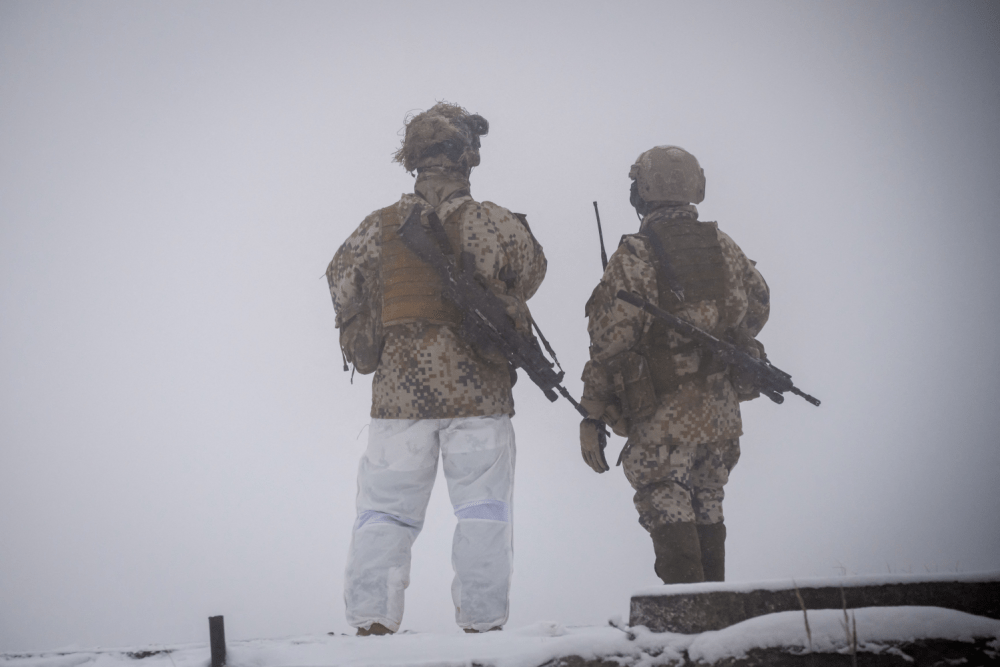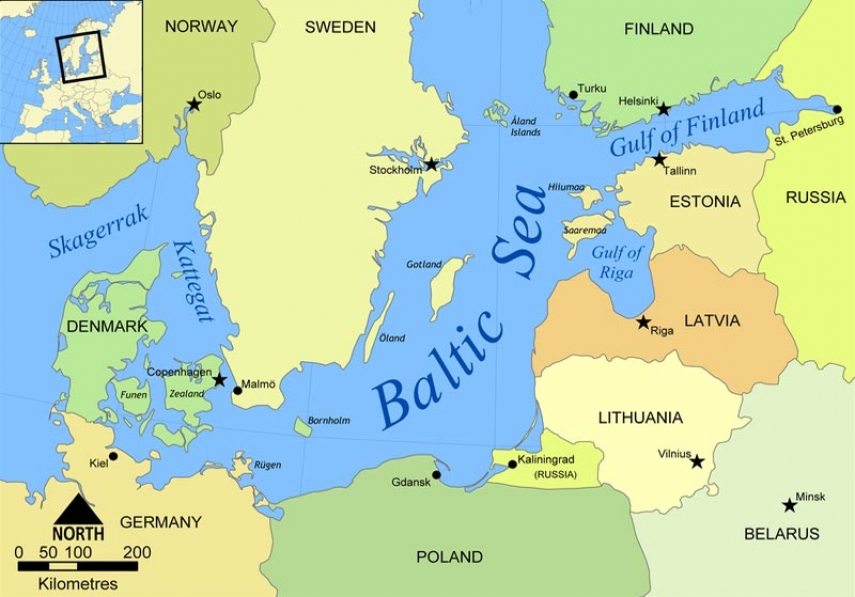•Moscow’s aggression has stirred old fears in its neighbors.
By Kristaps Andrejsons
It has been a turbulent few months in the Baltics. If you know history, it shouldn’t be surprising that Baltic publics are worried about Russia and the tumult in the post-Soviet region. The Baltics—Estonia, Latvia, and Lithuania—were occupied by first the Russian Empire and then, after a brief period of independence between the world wars, the Soviet Union. Revanchists in Moscow have clung on to the idea that they have a right to the Baltic states, even after more than 30 years of independence.
The migrant crisis sparked by the Russian-backed dictator Aleksandr Lukashenko on the Belarusian borders (especially with Poland but with Lithuania and Latvia, too), the potential of escalation of conflict in Ukraine, and even the chaos and brutal crackdown happening in Kazakhstan right now serve as a grim reminder that “business as usual” just isn’t a valid survival strategy for the Baltic states at this point. Focusing on collective security in the region, taking threats seriously, and taking care of military budgets are necessities.
On a state level, this concern is clearly noticeable. In its annual report, the Latvian State Security Service concluded that the No. 1 security threat for Latvia in 2021 was the Russian secret services, with the corresponding Chinese and Belarusian agencies taking second and third place. At the same time, on Dec. 21, 2021, the defense ministers of Estonia, Latvia, and Lithuania—Kalle Laanet, Artis Pabriks, and Arvydas Anusauskas, respectively—issued a joint statement after a meeting in Kaunas, Lithuania. There, they called for a joint approach “to counter Russian and Belarusian attempts to destabilize European security.”
The Baltic ministers were also critical about the Russian attempts to “establish spheres of influence in Europe and deny sovereign countries’ right to determine their own future,” especially referencing the shared history of the Baltics and how it turned out last time that something like this was happening. The statement noted that the Baltic states are greatly concerned about “Russia’s concentration of military forces on the borders of Ukraine.” Most importantly, they concluded their statement by saying that the Baltics are standing with Ukraine: “Given the urgency to strengthen Ukraine’s defence capabilities, [the ministers] expressed readiness to provide immediate support for Ukraine, including all available non-military and military instruments of power, including lethal weapons.”

Statements like this are nothing new. The Baltic states have been worried about their relationships with their eastern neighbor—and former occupier—since forever. The only states on Russia’s border with which it has warm relationships are those that have large issues with corruption and democracy themselves. That’s not surprising; the crushing of the Prague Spring in 1968 and the Hungarian Revolution of 1956 is burnt into the memory of Russia’s neighbors. In the Baltics, Soviet-era suffering is still remembered: the mass deportations to gulags, the brutal crackdowns on the postwar resistance movement, and the ever present threat of being abducted on the street by a KGB van that looked like a bread or mail delivery truck.
It is these painful memories of the past that make Baltic citizens worried—because they can see that not much has changed in Russian politics since the Soviet days. Vladimir Putin has already beat Leonid Brezhnev as Russia’s longest-serving leader since Joseph Stalin. What happened in Georgia in 2008 with the so-called border conflicts had clear similarities to the Winter War, when the Soviets invaded Finland; Crimea in 2014 followed the same scenario as the occupation of the Baltic states by the Soviet Union in 1940; and the troops that now have been sent to Kazakhstan to quell that popular uprising are reminiscent of the crushing of revolt in Hungary and Czechoslovakia. As the old joke goes, like the Warsaw Pact, the Collective Security Treaty Organization is a defensive alliance because it only invades its own members.
It is because of this shared past that the Baltics are ready to help Ukraine and support it as much as possible. The Baltic states have learned from past mistakes and understand that collective security is the only hope of survival. NATO membership is taken extremely seriously, and membership came with a sigh of relief. In the Baltics, even the most Euroskeptic populists, distrustful of Brussels and the United States in other matters, never say anything critical about the Baltics being a part of NATO and the necessity of military spending. And of course, due to recent Russian actions, support for membership in the alliance has grown even stronger.
However, the important difference between the Baltics and their Western partners is attitude.
There is much less of the old belief that “Russia won’t invade the Baltic states because we’re in NATO.” There’s more of a conviction that “when—not if—Russia comes again, we can defend ourselves, and it won’t be another 1940.” That’s an especially prevalent idea among young people and those with military ties. Membership rates in Baltic organized militias—the rough equivalent of the National Guard in the United States—have soared, last year increasing by 11.5 percent.
The military leadership has always been wary of Russia. When I interviewed, back in 2018, a Latvian National Guard officer who served in Afghanistan as a Soviet soldier, he bluntly stated: “There will be another war. I don’t know when or how, but it’s coming. It always has, and until something truly spectacular happens in Russia, it always will.” The attitude in the post-Soviet sphere is that “the Russians are going to have boots in our countries again.” This attitude was often called paranoid in the past, especially before the attacks on Georgia and Ukraine. The Baltics have been called fearmongers, such as when they raised concerns about the statements of various politicians, Russia’s activities in Chechnya, and in its internal oppression of the opposition, but hey, as Baltic citizens say, we’ve seen this before, and we always take threats very seriously.
One reason for this is that most people in the Baltic states speak Russian. It was the state language of the Soviet Union, mandated everywhere and enforced on these countries in a broad Russification campaign back in the Soviet days. In Latvia, for instance, 37 percent of people are native Russian speakers and many more fluent; a lot of Latvians watch Russian media, both official and otherwise. And while populists and clowns such as Vladimir Zhirinovsky—the leader of the Liberal Democratic Party and a well-known figure in Russia’s “controlled opposition” who has called for the immediate bombing of Kyiv—might be ignored in the Western media, in the Baltics, he and people like him are watched closely.
As one of the more prominent Russian journalists, Alexander Nevzorov, a presenter for the Echo of Moscow radio station, recently stated: “Russian media is full with information about how our neighbors should fear us, how we can turn the world into a nuclear graveyard full of ash, how our military can conquer them in less than a day, how we should restore the borders of if not USSR then definitely the Russian Empire, how it all belongs to Mother Russia—and then we’re surprised when our neighbors actually listen and believe us and take this into consideration and protest.”
And I guess that would be the best explanation of the mood and situation in the Baltics and by extension in the post-Soviet sphere: We’ve been here before. Now it’s Kazakhstan and Ukraine; tomorrow it may be us. And if we don’t help and support Ukraine now, how, then, will we be able to hope for someone else to support us? Last time, back in 1940, we did nothing and sat in the corner, hoping that everything shall pass naturally. It didn’t, and Stalin came roaring in and caused a tragedy for our nations that will never be forgotten. So we listen to what Russia says and believe it. So far, we have been given no reason not to.

